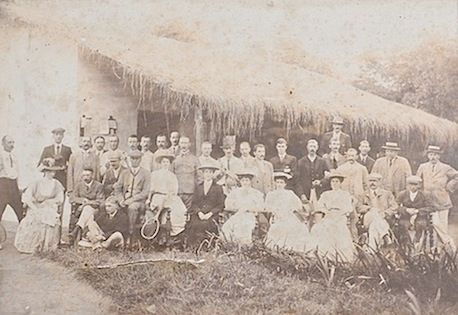The White Planter's Coffee Club
Peering through time, the mists are thick. In their haze are white men from six-thousand miles away, seeking fortune and adventure in the jungles of Malnad.

Years ago, I often shuttled with my parents between Bangalore (and Mysore) and Mangalore, and crossed the coffee-belt midway. In all my memories I peer through the trees of the plantations from the rear window, always through mist or rain or the dark, looking for the fabled estate-mansions. I saw my first plantation-homes these last years, after acquiring a profession and having gone grey—the mist has thinned and their mystery has vaporised. But the magic of my imagining returns if I peer through time to beyond a hundred years ago, where the mists are thicker, and in their haze are brave men from six-thousand miles away, seeking fortune and adventure in the jungles of Malnad.
Men like Middleton. He came to Munzerabad (Tipu's Sakleshpur) from Ceylon, after three years of growing coffee there. An officer took him to the virgin ghats and told him to take the jungle from this hill to that, and from that hill there to this hill here for no tax at all, but to remit quarter of the earnings to the government. Middleton founded the Kadamane Estate there. When he had succeeded to his satisfaction, it was time to take a wife, and he went to England to fetch one, and brought her to Kadamane on an ox-cart, arriving at night. In the morning, her first day at her Indian home, his bride went out and saw yesterday's oxen were today two bloody carcasses, devoured by a tiger before dawn!
To sense that past, I went with Nagegowda's Bettadinda Battalige to the Munzerabad Club, established in 1893 by white planters, for white people. Ramachandra, its president today, is a lean, fit, reticent, classical planter with modern problems, worrying what to do with the horn-bearing skulls of wild game that gazed upon us while we chatted about the times when they were hunted down. He brought Subbanna, past-president, member since 1951, seventy-nine years of age but alert through every peg, and brimming with memories of drinks shared and graces experienced with English gentlemen in the years immediately after Independence.
Morning, I sat on the raised verandah with a breeze pleasant on the skin but pungent in the nostrils, the air spiked with mine-dust from the lorries of Bellary which run all day through the main street of Sakleshpur. The rains had brought down the temperatures.
The sun was easy on the eye and his light danced off the leaves. Ramachandra had arranged for Basanna (past president), and Karthik, the young honorary secretary-successful planters-to show me the minutes of meetings from the 1900s.
Extraordinary men-Crawford, Radcliffe, Young, Middleton (junior)-have signed notes on ordinary affairs: missing cutlery, the minimum whiskey that should be stocked, other such matters. In profession, and in causes espoused, each man's story is a potential bestseller. Lt. Col. Crawford came to India when he was eighteen with his brother, seventeen. They arrived in Madras, boarded a train to Bangalore, then to Mysore, and travelled by ox-cart to Hassan. The eighty-mile journey to Hassan took five days, and Crawford has narrated remembrances not of hardship suffered but of kindness received from the two gowdas who drove their ox-cart.
Moving on to Munzerabad, the Crawfords established themselves as major planters, and built a reputation as benevolent masters: when clearing the jungles for coffee, they first cleared areas for workmen's quarters; they brought clean water down from the hilltop through pipes for their workmen; the nearest hospital being miles away, they arranged a minimal dispensary on the plantation. Crawford has claimed he has no recollection of ever having quarreled with a workman.
Their business expanded and their largesse grew. East of Munzerabad Club, the Crawford Hospital is even today Sakleshpur's largest. Similarly, Crawford donated land for the Central Coffee Research Institute in Balehonnur in Chikmaglur. In Mysore, the University Offices have for decades been housed in stately Crawford Hall. The old school west-side of Munzerabad Club bears the name of its patron, E H Young.
What did the club mean to them? I asked in Bangalore: Ms Shelagh Foster, as sprightly today as one seven-decades younger, who has reared horses in Malnad and Bangalore, whose late husband came after his education to join his father in the plantation business in Munzerabad, remembers the parties, such as the racing party when they took the horses up to the Munzerabad Fort and raced them on the downs.
It rained and everyone was soaked. They descended to the club and changed and distributed prizes there, and the men retired to the bar and the women went into the lounge, as was their routine.
There were movie nights. Lots of tennis. And rarely, there were drunken nights.
Subbanna has heard of one such night from before his time: Three English bachelors rode into the club one day and were drunk by evening. To go higher, they climbed the the billiards table and began a game from on high: more drinks were downed, and after each round they hurled the glasses to the walls; some rounds, they emptied the drink on the butler's head, asking while pouring, "do you like it?" When they finished their drunken sport and rode out, dawn was already upon them.
A note in the minutes is probably related to this incident: it refers to "senseless damage" which the committee "deprecated," and for punishment all those present were asked to pay a fine. While determining the penalty, the committee noted that the billiards table was in need of repair even before the incident.
Subbanna also offered a respectful remembrance of an Englishman's Sundays at the club. He'd come in the morning, check into one of the four rooms the club had then. He'd order a high-breakfast to the room. And a double brandy. "Don't disturb me hereon, I'm reading," he'd instruct the butler. No lunch was arranged for him, only high tea. When the butler went up with high tea, the double brandy would be sipped only just. At dinner, he'd ask the butler to pour out the brandy. Subbanna is struck by the elegance of all this.
After a point, miffed that I'd strayed too long, the future pulled me round, his hand hard on my shoulder.
What did the planters I met foresee for Malnad? Young labour has left for the city. Many planters' children have gone where the Crawfords and the Schofields came from, and are exercising there the enterprise that white men showed in Malnad. Schooling children are sent to Bangalore and Mysore with the wives so that eventually, these children will go westward too. So? With senior citizens as owners and workmen, is the coffee-belt set to buckle? Who are the innovators who possess the enterprise and the ambition of the pioneers?
Ramachandra and I went to Anand Pereira's plantation. Pereira begins and ends his workday zen-fashion, meditating by a high tank teeming with Japanese koi: the sprawl of his estate is on full display from the tank.
Through inventive irrigation and the use of his scholarship in microbiology, he has created one-hundred and twenty acres of springy soil that support a fine-looking coffee plantation: "Feel the soil, Shashi! Feel it!" And, worried about the warming, he is creating a canal system to prevent the earth from cracking, should famine strike. "No time, Shashi! No time!" He walks faster as he says this, as though to create time.
We finished the tour late-afternoon and sat with his wife and watched their children play cricket with the farm-hands on the kana. Suddenly Pereira asked me: "What can planters learn from manufacturing, Shashi?"
With trees looming round us, there was such silence in that womb in which we sat, except for children scoring and denying runs, and prayers welled up in me for his success, for success for all planters, prayers that were, in truth, utterly selfish.


